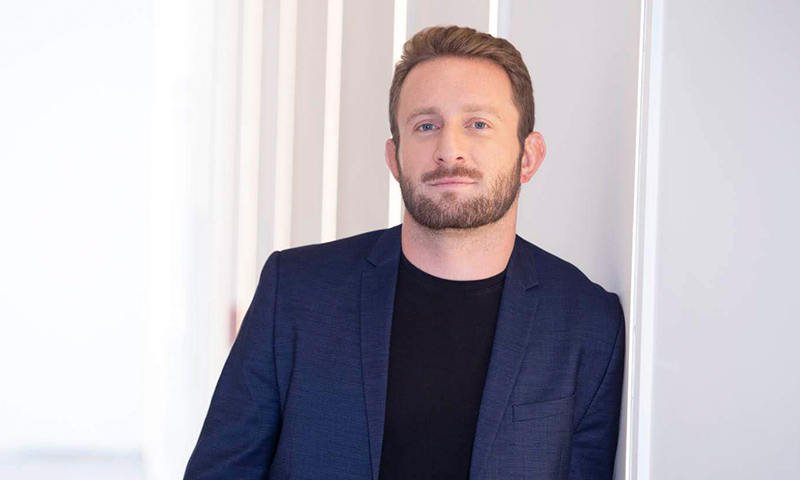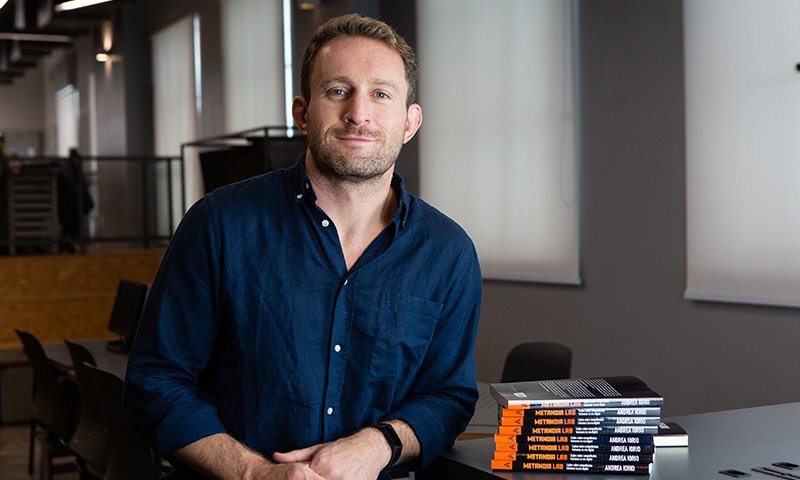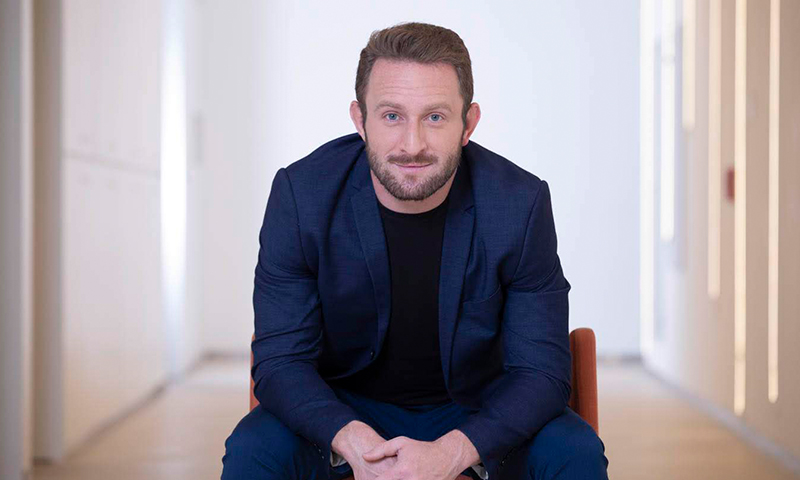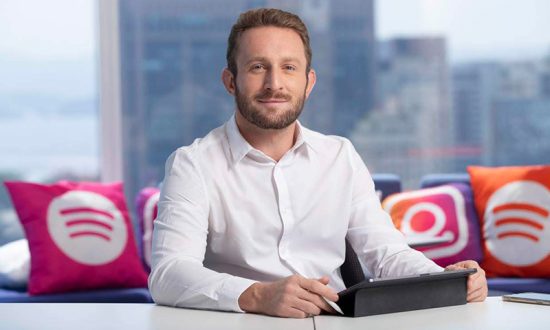Andrea Iorio is one of the most requested keynote speakers about Digital Transformation, Leadership, Customer-centricity and Web3 globally, and he shares his thoughts and ideas at the intersection of business, technology, philosophy, and neuroscience in his more than 200 keynotes per year to companies such as Abbott, Bayer, Cargill, Dow, IBM, Roche, Syngenta, Tetrapak and more.
Andrea is a columnist at the MIT Technology Review Brazil, the official host of NVIDIA’s podcast in Brazil. He holds more than 10 years of experience in multinational and tech companies: he was the Head of Tinder across Latin America for 5 years, and Chief Digital Officer at L’Oréal Brazil. He is an economist with a Degree from Bocconi University (Milan, Italy), and a MA in International Relations from Johns Hopkins’ SAIS (Washington, DC), and is now an MBA professor at Fundação Dom Cabral. He is the author of 3 books in Portuguese: “6 Competências para Surfar na Transformação Digital”, “O futuro não é mais como antigamente”, and “Metanoia Lab: lições sobre competências humanas na era digital”: the first one reached the no. 1 position on Amazon in the People Management and Leadership sections in Brazil.
Recently, in an exclusive interview with CXO Outlook Magazine, Andrea shared his insights on the top three digital transformation trends to watch out for in the future, his inspiring professional journey, the mission and vision behind Andrea Iorio Keynotes consultancy, future plans, and much more. The following excerpts are taken from the interview.
According to you, which are the three significant digital transformation trends to keep an eye on in 2023?
It is a fact that making predictions about tech trends has been harder and harder in such an unpredictable world (see the recent buzz around the metaverse, and its subsequent rapid implosion), at the same time it is possible to notice trends that are here to stay and that we should keep an eye on in 2023. The top 3 trends according to me are as follows:
- Obviously, we should look at Generative AI. We have seen through the rapid adoption of Generative AI tools such as Chat-GPT and Midjourney (and the loyalty of its users as well), that Large Language Models reached maturity and are from now on part of our daily lives.
- Less obviously, we should look at Edge computing. With the exponential spread of Internet of Things (IoT) devices that are going to generate huge amounts of real-time data, cloud computing is not going to be enough (since data is sent and stored into centralized servers of the Cloud service provider), but this data is going to have to be processed on the spot. This is exactly what Edge computing does, and we should look at it more closely.
- Last but not least (and you might find this curious since it is not a tech trend per se), it is Leadership upskilling in Digital. Yes, I feel that the third most important trend is not a tech trend, but a Learning and Development (L&D) trend: a recent Technavio report about Corporate Leadership Training Market Growth points to a 9% CAGR until 2026 of investment into leadership training, and much of that is in the Digital space. I see much of that because of my job, and I feel that this is a trend here to stay, because of the growing importance of digitalization on businesses of all sectors and sizes.

Andrea, please take us through your professional journey. How has been your leadership experience and what are the major takeaways from each of the roles?
Let me start off by saying that my professional journey has been so unique and non-linear that often it is hard to explain. I have a background in Economics (I studied at Bocconi University in Italy, my home country), wrote my final thesis in Egypt, as an exchange student at the American University in Cairo, and then moved to the U.S. to pursue my master’s in international relations at Johns Hopkins University.
After that, in 2011, I moved to Brazil, where I started working at Groupon as a sales manager (that is where I learned so much about people management, hands-on) and after 3 years, I was hired by the Match Group to launch Tinder, the dating app in Brazil. That was my first leadership experience, and as the Country Manager, I managed to take the app to the top grossing position in the Brazil App Store, as well as make Brazil the 2nd biggest market for the app. After my 5 years at Tinder, I challenged myself with a new role as a Chief Digital Officer at L’Oréal: a totally different context, that made me learn more about Digital Transformation in traditional businesses – the topic that nowadays I cover in my job as a keynote speaker and best-selling author.
Tell us about Andrea Iorio Keynotes consultancy. What is the mission and vision of the company?
I launched ANDREA IORIO Keynotes during my tenure at L’Oréal as a side business that would basically focus on the marketing and sales of my keynotes, workshops, and Podcasts. My customers are traditionally leaders in traditional business, often Fortune 500 companies, and my mission is to inspire and educate them about the fact that Digital transformation is not only about technology, but it is mostly about people, namely that it is about developing a new skill set in the Digital world as much as it is to hire and roll out the latest technologies. The vision is to become the leading speaker globally on the topic, and I am starting to see the results: I have been featured in DMT Palestra’s respected list of the top 10 most requested speakers in Brazil, and I am also getting speaking engagements in the U.S. and Europe.
You are the author of 2 Amazon best-selling books focusing on HR and leadership arena respectively. What was the inspiration behind writing these books and what was the most challenging part for you as a writer?
I wrote my first best-selling book, called “6 competências para surfar na transformação Digital” (in English “6 skills to navigate the Digital Transformation”) during my tenure at L’Oréal, and the inspiration behind the book (as well as my subsequent ones) was exactly the lack of a guide about an effective leadership in the Digital Age. I felt that most of my colleagues in executive roles were struggling not so much to understand technology, but to change their way of making decisions and of behaving in the Digital age. The book started off as a guide for that, and it proved to be successful to the point that after publishing them in Portuguese, I am now launching my first Book in English, called “Meta-leadership: a new leader’s skill set in the world of AI and Web3”.
When it comes to the biggest challenge, although all aspects of writing a book can be challenging, I believe the hardest one for me was to carve out time from my executive agenda at L’Oréal to write my first book. That is why, since I started to dedicate myself 100% to speaking, I set aside all mornings to just write – usually short articles, or Podcasts scripts, that lay the foundations of my new books.

As an MBA Professor, you teach and focus on the topic, “Digital Mindset and New Capabilities” at Fundação Dom Cabral. What is the importance of this subject and how will it help executive MBA students in their careers?
The “Digital Mindset and New Capabilities” class that I teach at Fundação Dom Cabral, the no.1 Executive school in Latin America according to the Financial Times ranking, is totally based on my theory (also laid out in my books), that leaders – and in this case, the MBA students I teach to at Fundação Dom Cabral are all executives in large businesses— should develop a new skill set and a new mindset in order to be complementary to technology and not be substitutable. Think about it: if we think that the most important skill of leaders is to have a lot of experience or knowledge about the company, product, or market, he or she works with, well, let me tell you that we can’t compete with Google or Chat-GPT when it comes to that. We can compete though if we focus on critically thinking about and challenging all this content and knowledge – something that technology, so far, does not.
In your opinion, which are the top 3 skills that every future-ready leader must possess?
I believe that the 3 most important skills that every leader should possess nowadays, as I lay out in my latest book “Meta-leadership”, are:
- “Data sensemaking”, namely the ability to better make sense of the insights generated by AI, and to select the right KPIs to monitor while managing the business.
- “Reperception”, namely the ability to ask better questions (rather than just providing pre-formatted answers) and to think critically about new business problems in a world that is changing very rapidly.
- “Antifragility”, namely the ability to learn from “smart mistakes” (leaving efficiency to AI and embracing experimentation like a scientist).
As a digital transformation, innovation and leadership keynote speaker, entrepreneur, and podcast host, how do you develop yourself and continue to grow?
I like to say that the true job of a keynote speaker is not to speak at events, but to constantly study, research, write about the most important topics in your field – speaking will be a consequence of that. This is why my mornings are almost exclusively dedicated to studying and writing: I take no calls, I don’t do any meetings (the only exception if I have a speaking gig), but I am solely focused on researching and writing about topics, news and trends that are important for my work.
Can you name a person who has had a tremendous impact on you as a leader? Maybe someone who has been a mentor to you? Why and how did this person impact your life?
This question is very easy for me to answer, since this person is undoubtedly my father, Sergio Iorio. I grew up with my father taking me on business trips every year, mostly to Asia (he was one of the first Italian entrepreneurs to do business with China), for his newly founded chemical company, called Italmatch Chemicals. I learned so much in these trips, seeing him negotiate with businessmen from different cultures with empathy and grit. The result is that Italmatch Chemicals grew to a 1b US revenues company today, being a leading specialty chemical business in Water treatment additives. Learning with my father has been the best MBA I could ever do, with a plus: it was for free!

What is the secret mantra behind your success?
I do not believe there is any secret mantra or recipe behind my success, but maybe I should point to the attitude that I deem the most important for my success so far, namely: focusing on the actions, and not on the goal. What I mean by that is that frequently people focus so much on designing ambitious visions for their business (or constantly thinking about that think of New Year’s Resolutions as an example, it’s exactly that!), that they lose sight of the small but necessary steps needed to achieve them. Of course, I set a long-term vision and goals for my business, but I constantly think: “What should I do today in order to get there? ”, and act, enjoying every step of the journey. The “20-miles march” concept by Jim Collins is my inspiration when it comes to this.
What advice would you give to someone going into a leadership position for the first time?
I would say, “Let go of ego”, since this fear can be the biggest obstacle to true leadership. Why so? When we get into leadership positions, we tend to start convincing ourselves that we are good enough, or better than others, and that boosts our ego – and ego is the biggest enemy of leaders, since it is ego that prevents us from continuously evolving and learning. As leaders, we are more surrounded by people that agree with us, so that we cannot run the risk of becoming victims of our ego, so my advice for someone going into a leadership position for the first time is: ‘keep your ego in check”.
What is your biggest goal? Where do you see yourself in 5 years from now?
At the moment, I am 100% focused on expanding my keynote speaking business internationally, and this is my 5 years goal (minimum). Keynote speaking is a long game – namely it takes long to get into this market and be compensated for that (this is why most people give us, since they become growingly impatient not seeing results, but this takes a long time), at the same time that once you get into this market, you are likely to stay forever (if you are able to reinvent yourself). Look at household names such as Tony Robbins, or even Simon Sinek, who have been at the top of the game for many years now. The current “problem” I am trying to solve is how to scale the business, and the best way is going international focusing on keynote speaking in English and Spanish.


